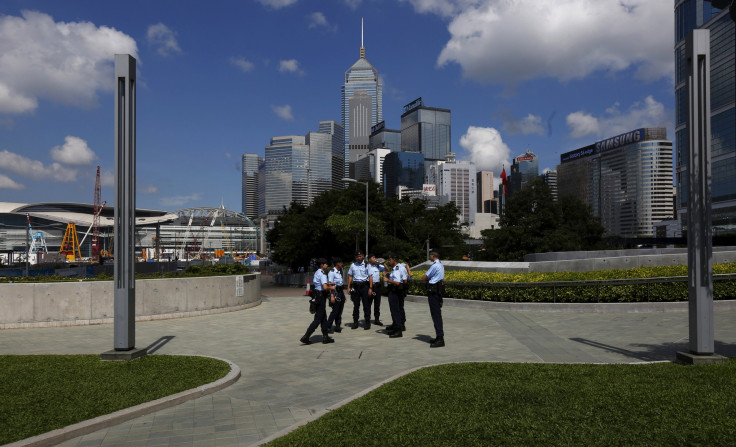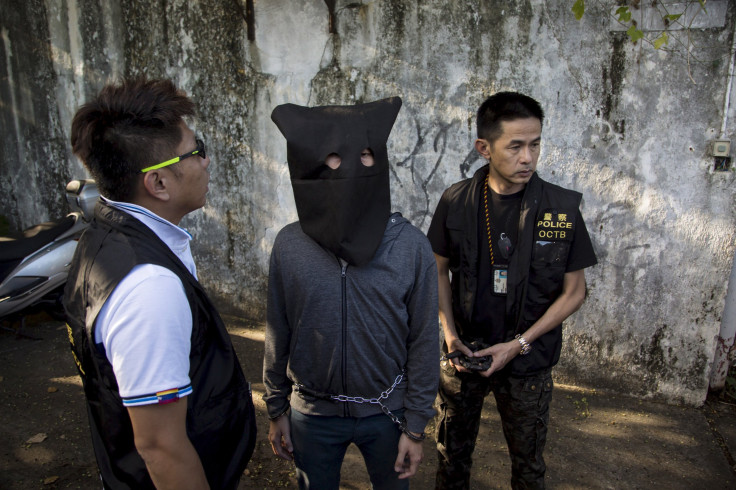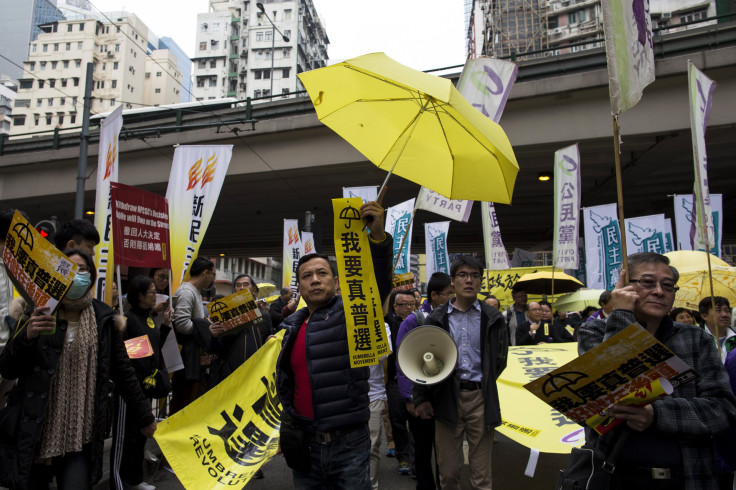Hong Kong ‘Bomb Plot’ Sign Of Rising Tensions As City Prepares To Vote On Controversial Electoral Reform Package

SHANGHAI -- Security has been tightened around Hong Kong’s government headquarters, as the city’s legislative council on Wednesday prepares to begin debating the government’s controversial plans for how the city’s next chief executive will be elected.
The arrest of 10 people in an alleged bomb plot has added to tensions, already high following last year’s three-month long protests against the Beijing-backed election proposal, which saw hundreds of thousands of people take to the streets. And while experts say legislators are likely to reject the government’s proposal, analysts say this will do nothing to soothe what is now a deeply divided society.
Hong Kong police said on Tuesday that they had arrested 10 people on “suspicion of conspiracy to manufacture explosives,” after two people were caught testing explosives in a disused TV studio in the city on Sunday. Police said the detainees, six men and four women aged between 21 and 58, were members of a recently formed radical group called the “National Independence Party.”

Police sources told Hong Kong’s South China Morning Post that they were not yet characterizing what had happened as a "terror" plot, since no specific target had been identified, and were maintaining their grading of the level of threat in the city as "moderate."
And democratic politicians expressed surprise at the case; some, like Labour Party legislator Cyd Ho, said it was “just a naive plot … by some disorganized people."
Police said those detained included two people who had been involved in aggressive protests with mainland Chinese tourists earlier this year, in what was seen as a backlash against China’s growing influence over Hong Kong following last year’s Occupy Central protests (also known as the Umbrella Movement). However activists involved in those protests said they did not know the people arrested, and some democratic activists have even suggested that the bomb plot was a fake, part of a conspiracy to smear opponents of Beijing’s political plans for the territory.
Whatever the truth, the incident is a reminder of heightened tension in Hong Kong in the aftermath of last year’s protests. Opinion polls show a society split almost down the middle over whether to support or oppose the Beijing-backed plan, which offers Hong Kong citizens the chance to vote for the city’s chief executive, for the first time, in 2017 -- but limits their choice to two or three candidates, who must first win approval from a selection committee expected to be dominated by Beijing loyalists. One recent poll showed 51 percent in favor of passing the bill -- but many others have shown the two sides neck and neck, with both getting around 43 percent to 46 percent support, and little middle ground.
Opponents of the plan, who denounce it as “fake-” or “pseudo-universal suffrage,” are this week again demonstrating outside the headquarters of the government and legislative council, which is expected to vote on the proposal on Thursday or Friday. Counter demonstrations have also been organized by supporters of the plan. And in a reminder of the febrile atmosphere, the city’s Chief Executive C.Y. Leung on Tuesday made a point of stressing that the police had sufficient manpower to prevent the legislative council buildings from being stormed by protesters.

“Hong Kong is rife with wild rumors at the moment,” Michael DeGolyer, head of the Hong Kong Transition Project at the city’s Baptist University, told International Business Times. “The political sphere has become so divided: not only are there splits between those for and against the plan, but also within the pan-democratic camp, between those who still say they support Hong Kong being part of China, and those who want a separate identity.”
There has been constant speculation that some members of the pan-democrats could switch sides, as a result of pressure -- or blandishments -- from Beijing. And Leung, who faced repeated calls for his resignation during last autumn’s protests, on Tuesday called on the pan-democratic members of Hong Kong’s legislature to back the government’s plan, saying they had made “multiple significant misjudgments,” including a belief that they could “use illegal means and pressure from the masses” to force Beijing to revise its policy.
And in remarks apparently aimed at anyone thinking of reprising last autumn’s protests, which blocked main roads in Central Hong Kong for more than two months, Leung added that the alleged bomb plot was a reminder that tolerating even peaceful illegal protests would “only let people with a violent tendency use the same reason to rationalize their violent behavior,” the South China Morning Post reported.
Leung’s remarks are a reminder of the tough approach to law and order, which many in the pan-democrat camp see as having spurred the street protests, which began in late September last year after police fired tear gas and pepper spray at peaceful demonstrators, many of them young students.
Many people who had never demonstrated in their lives took to the streets to support the demonstrators and express anger at the police action, which many said went against the tradition of Hong Kong’s police as one of the region’s most restrained forces. Activists said the police’s action was a symbol of China’s growing influence over Hong Kong society.
And it’s for similar reasons that members of the pan-democratic camp have vowed to oppose the government’s electoral reform package: in particular they have been angered by Beijing’s refusal to compromise in any way on the proposal, despite the months of popular protest last year.

Chinese officials have hinted recently that if the pan-democrats accept this limited form of universal suffrage now, they might be allowed a wider choice of candidates in future elections. If they don’t support the reforms on the other hand, Beijing has implied that all political reform will be off the table, and the 2017 election will revert to the old rules, under which the chief executive simply has to be approved by a majority of a 1,200-member selection committee nominated by Beijing.
But Pan Democrats say that by accepting the package now, they would be giving a veneer of credibility to an undemocratic system -- and their acceptance would remove any incentive for Beijing to introduce further reforms in the future.
“Once something is put in place you need a two-thirds majority of the Legislative Council to change it, to make any amendment -- and that will never happen,” Civic Party legislator Claudia Mo told IBTimes recently. “So it will actually be worse for Hong Kong if the reform package is passed -- because after that, whoever’s hand-picked by Beijing, and gets his million plus votes in an election could claim he’s got the people’s mandate, and he could do whatever he wants, or rather whatever he was told by Beijing to do -- that’s going to be even worse.”
Politicians like Mo, and some of those involved in last year’s student protests, therefore insist that they are sticking to their guns -- and that they are committed to a long-term campaign for greater democracy in Hong Kong, however difficult that may be.
Others warn that their strict line could alienate the public in the longer term: Hong Kong Baptist University’s DeGolyer says that many people in Hong Kong remain pragmatic, with opinion polls repeatedly showing that around 5 percent or 6 per cent of those who say they do not personally support the reform package still want the legislature to pass it, in order to avoid future tensions with Beijing.
However, the pan democrats say they will not be swayed by opinion polls. This week’s vote could be the start of a long period of continuing division in Hong Kong society.
© Copyright IBTimes 2024. All rights reserved.






















